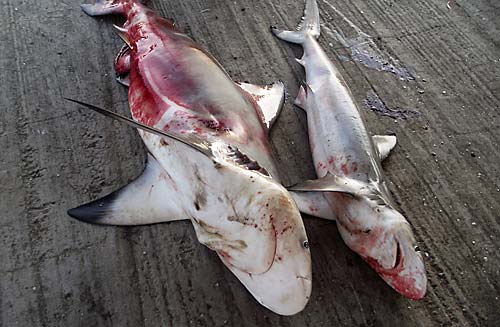Sharks receive improved trade protection measures
Bangkok, Thailand, 11th March 2013—Governments at a United Nations meeting on wildlife trade today voted for better international trade controls for shark species that are in severe decline because of overfishing for their high-value fins and meat.

Three proposals were successful in listing five shark species under Appendix II of CITES (the Convention on International Trade in Endangered Species of Wild Fauna and Flora).
Under Appendix II strict measures will be put in place to regulate the international trade in the fins and meat of the species concerned. Governments have been given up to 18 months to implement the new measures.
Five species—Oceanic Whitetip, Scalloped Hammerhead, Great Hammerhead, Smooth Hammerhead and Porbeagle sharks—all obtained the two-thirds majority amongst voting governments to become included under Appendix II of the Convention.
They include the first sharks to be listed under CITES because of concerns over the level of trade in their fins. The Porbeagle is primarily traded for its meat. The global value of the trade in shark fin industry is estimated by the UN’s Food and Agriculture Organization to be around $478 million per year.
The sharks discussed at today’s meeting are particularly vulnerable to overfishing because they are all slow growing, late to mature, long-living and produce few young, which means it is difficult for populations to recover from overfishing.
Some populations of the shark species listed, including the Ocean Whitetip shark, have declined by more than 90%.
Previous attempts to list shark species impacted by international trade for their fins and meat at CITES have failed, in part because of disagreement over which body was the most appropriate one to manage marine species. They included the Porbeagle shark, which was initially voted onto Appendix II, but later the decision overturned during a final conference plenary session.
Conservationists were bitterly disappointed at the time, and while today’s decisions were warmly welcomed, the potential for them to be overturned later in the meeting remains.
“Todays’s outcome could be a turning point in how CITES can assist in the regulation of trade in marine species,” said Glenn Sant, Marine Programme leader with TRAFFIC.
“If accepted in plenary, this meeting will go down in history as the one where CITES finally realised its marine potential.”
“It’s a bittersweet day for sharks,” said Sant. “While their adoption on CITES is warmly welcomed, it’s a sad indictment that their populations have fallen to such a low level that such measures have become a necessity.
Also being discussed today are proposals to list Manta rays. The species are at risk of overharvesting because for similar reasons to sharks. They are predominantly caught for their highly valued gill plates.



